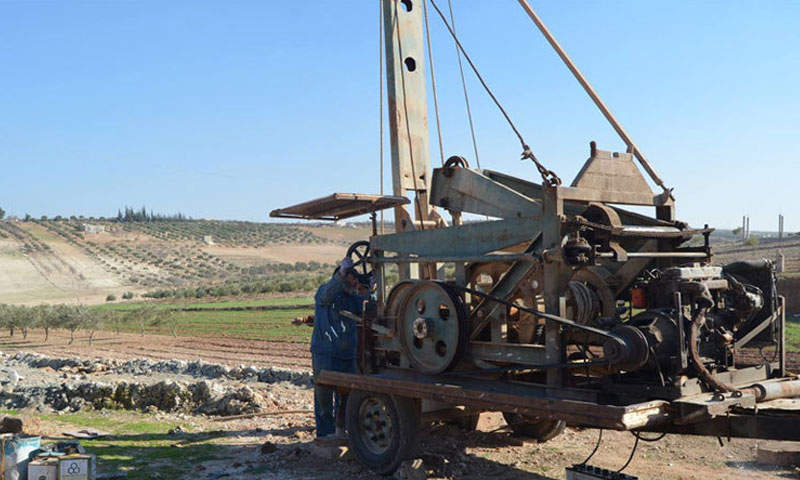The lowering level of groundwater is one of the greatest threats to agricultural production in Syria in the near future. The problem is arising in the northern countryside of Homs, where the farmers are actually sensing the danger.
This year, the groundwater level dropped to less than 100 meters and the majority of wells in the area went dry, excluding massive areas from irrigated cultivation.
The problem is not new to the area, as it dates back to more than 20 years, starting with expanding Homs into the new Wear and building residential towers, for prior to building these towers the deepest well in rural Homs did not exceed 20 meters.
However, with the start of digging the towers’ foundation, the water began to flow into the dug areas. Thus, the construction was halted and the construction companies obtained an approval to install cement in the soil to block the flow of water, forming a concrete wall between the northern countryside of Homs and Qattinah Lake that provides the area with groundwater resources as reported by an engineer ( refused to be named for security reasons) working for the Assi Basin Management of the Ministry of Water Resources in Syria.
Over drilling
Requesting a well-drilling license has always been one of the most difficult transactions in Homs province. The Assi Basin Management had stopped granting well-drilling licenses almost entirely except for influential people. However, once the area broke out of the regime’s forces control, the farmers started to dig wells and the drilling costs dropped to less than 1,500 Syrian pounds per meter, which ended with the drilling of at least 3,000 wells throughout the area, Abu Thaer, an owner of a drilling rig, told Enab Baladi.
When the regime’s forces regained the area in May 2018, the well-drilling did not stop, but the costs witnessed an increase, amounting to more than 9,000 Syrian pounds per meter.
Abu Thaer pointed out that the diggers did not stop working even after the reconciliation agreement. Nothing has changed except that the security detachments, police and municipal units wanted their share of the money, for digging a meter costs 1,500 Syrian pounds and the stocks of the security services and their dependants is 7,500 Syrian pounds.
The engineer, working for the Assi Basin Management, accentuated that over drilling poses a great risk to the area, and despite the fact that the Directorate and Municipalities are not granting licenses, the insecurity prevents imposing order on the process of drilling.
Irrigation water absent for more than 10 years
Prior to 2011, irrigation water was gradually reducing in the northern countryside of Homs, and before that, there was a strict water rationing, on the allegation that the area was not cultivated with strategic irrigated crops such as sugar beet and cotton.
However, these crops were not cultivated in the area mainly due to the hour-based water rationing system – dividing water shares among farmers, each getting his/her shares at a certain hour. The farmers used to sign contracts with the Peasant Association for planting beet or cotton season, but the association would cut the hourly shares granted to the farmer causing him a great loss.
Abu Khalil, a farmer from al-Ghantu village, told Enab Baladi that “before 2011, the irrigation water was completely cut off from the area, on the basis that the farmers were not signing the agricultural contracts with the Peasant Association. The reason for this, of course, was the insufficient irrigation water delivered by the government. That triggered the farmers not to sign contracts with the association because the water shares were inadequate.”
The absence of irrigation water project is the main reason for the decline of groundwater tables, for significant amounts of irrigation water generally seep into the ground and feed the wells. Therefore, it is normal that the level of groundwater is dropping to this degree. Besides, the monsoon rains are incapable of raising the groundwater to the level it used to be.
Artesian wells solution and problem alike
The decline in groundwater levels has driven the rich farmers to think seriously about drilling artesian wells, despite their high cost and total prevention. This type of wells is reigned by the international agreements seeking to maintain water security among the member countries, not to mention that obtaining an artisan well-drilling license required a recommendation from the President himself before 2011.
At the beginning of the revolution, the situation was not as bad as it is now and the farmers were not willing to dig as deep as 450 meters. Nonetheless, the problem has aggravated, and the farmers gave bribes and dug artesian wells in spite of the high cost of drilling, which exceeds 11 million Syrian pounds, given the difficulty of extracting water, which stops at the level of about 180 meters.
The excavation of the artesian wells, nevertheless, affects badly the surface wells surrounding them, challenging, thus, the farmers with a new problem.
Abu Ahmed, a farmer from al-Rastan City, told Enab Baladi that “a neighbor of mine dug an artesian well. Once the well was dug, my surface well was about to dry, as well as the neighboring wells”.
“The farmer who dug the well has more than 80 dunums to cultivate, which necessitated that he digs the well,” wondering, “is it reasonable to dig a well worth ten million Syrian pounds to irrigate five dunams?”

